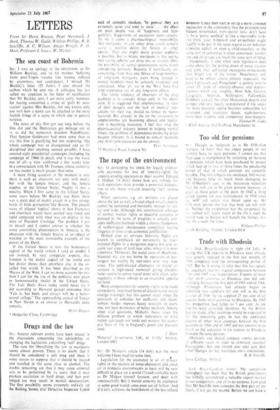The rape of the environment
Sir: In developing his thesis for legally enforce- able payments for loss of 'amenity-rights' by amenity-eroding operators to their victims. Edward 1. Mishan (14 July) shows how any subsidy for st:ch operations must provide a powerful disincen- tive to any move towards lessening their adverse effects. When operators, e.g. air services, arc placed above the law as well, a brutal attack on all amenity cannot be contained and inevitably spreads its ruin far and wide. Although this unrestrained sabotage of normal human rights to peaceful existence is pursued in the name of progress, it actually con- ceals inefficient methods within a clumsy framework of technological obsolescence completely lacking elegance or even crude economic justification. Mishan cites air services. Inter-city flights are known to complicate air movements by inter- national ffights to a dangerous degree but also re- quire vast areas of land near cities where it is most expensive. Moreover, the social costs of Heathrow, Stansted, etc. are not bottle by operators or pas- sengers but mainly by non-users over ery wide areas. The sophisticated alternative to inland air services is high-speed monorail giving cheaper, faster centre-to-centre travel times with silent, safer regularity without subsidy or an insatiable appetite for land. Were compensation for amenity-rights to be made compulsory, improved forms of inland transit would emerge overnight but this cannot occur when the provision of subsidies for inefficient and incon- venient modes imposes heavy taxation on every one, not least promoters of better methods. Among other vital questions, Mishan's thesis raises the delicate problem of which individuals or what nation can teach our lords and masters the econo- mic facts of life in England's green and pleasant land.
I. Dark Monorail lnsestments Ltd., 41 Criffel Avenue. London SW2






























 Previous page
Previous page